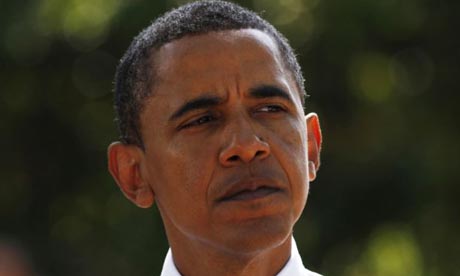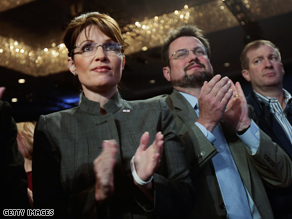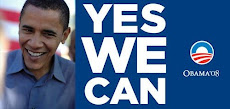
Democratic presidential candidate Barack Obama. Photograph: Bob Brown/AP
The opening was superbly choreographed. To the sound of thundering rock music blaring from speakers, several thousand people watched as John McCain's campaign plane swooped out of the sparkling blue Iowa skies.
The plane taxied to a halt only 100 metres away from the crowd gathered at an airport outside the city of Cedar Rapids. They cheered wildly as McCain and his running mate, Sarah Palin, descended from the aircraft and trooped through the throng, smiling and shaking hands.
Then things started to go wrong. 'Thank you so much, Iowa. It's great to be here in Grand Rapids,' Palin said as she took the stage, naming a completely different city in the far-off state of Michigan. 'CEDAR Rapids!' came shouts from the crowd. Palin ignored her gaffe and ploughed on with a speech that was quickly interrupted by anti-war protesters. For several minutes the hangar was filled with shouts and chants, drowning out the Alaska governor's words. Then McCain took the stage, and the same thing happened to him, forcing him off his script to address an unruly scrimmage as security hauled out the shouting demonstrators. 'The one thing Americans want us to do is stop yelling at each other,' McCain said in exasperation.
Suddenly, after hauling his campaign back into contention for the White House, the wheels are starting to come off McCain's fabled Straight Talk Express. The gaffe-ridden rally in Cedar Rapids was only one indication. In a week of almost unprecedented economic crisis, when Wall Street seemed on the brink of meltdown, McCain's presidential bid was hit by mistake after mistake, varying from the serious to the surreal.
As stocks dropped off a precipice, McCain said the economic fundamentals were strong. Then a senior aide seemed to suggest McCain had invented the BlackBerry. His top economic adviser, Carly Fiorina, confessed she thought neither McCain nor Palin was capable of running a large company. Then, in the middle of the worst financial collapse since the 1930s, McCain got the public endorsement of Donald Trump, a celebrity tycoon who symbolises raw capitalism. For a candidate trying to strike a populist tone, the backing of 'the Donald' was poorly timed. 'It's like a Saturday Night Live routine,' quipped rival Barack Obama on a campaign stop in Nevada.
At the same time the remarkable surge of support inspired by Palin seems to be ebbing. Polls show women voters drifting back to Obama, who has established a slim lead again. Palin is increasingly mired in the 'Troopergate' scandal related to allegations that she fired a senior official out of a personal grudge against her sister's former partner. Palin's star, which shone so brightly for two weeks and reinvigorated the Republican base, is showing every sign of dimming. But the real problem is the biggest one: the stunning economic rollercoaster of last week. Americans in their tens of millions have been glued to their TV screens watching banks collapse, stocks slide and their own government pump billions of dollars into the system to bail out troubled banks and insurers. It has turned the election right back to the core issue that Democrats have wanted to talk about all along: the economy and its terrible woes. McCain, with the first presidential debate looming this week, is now fighting the election on his opponent's strongest turf. In an America shaken and scared by the spectre of a second Great Depression, no one is talking about pigs, lipstick or moose-hunting any more.
But McCain is nothing if not a fighter. In Cedar Rapids he came out blazing against Wall Street, reckless investors and the regulators who let them place such risky bets. His speech was full of fiery language as he vowed to sack government officials, defend US workers and clean up Washington DC. 'Right now you are hurting and it is not your fault,' he told the crowd of several thousand packed into an aircraft hangar. 'It started at the top. It started in Washington. It started on Wall Street and we are going to fix it.'
The crowd dutifully cheered its support, swinging behind this new image of McCain as a man of the people. The applause lines just kept on coming. 'They turned our markets into a casino,' McCain added, to more cheers. 'The regulators were asleep at the switch. They were asleep, my friends. They were not working for you,' he said. It seemed to work, too, though only with an all-Republican crowd that had long bought into his message. 'I am very excited about this. McCain right now is the best thing for this country,' said Harry Meek, owner of a local Iowa pest management company, who had driven more than 100 miles to get to the rally.
Outside the confines of a friendly Republican crowd, McCain's message is likely to meet greater resistance. For many years, McCain has been an outspoken advocate of easing restrictions on Wall Street, not tightening regulations. His campaign is closely linked to lobbyists and the financial industry is a huge donator to his cause. That has allowed Obama's speechwriters to hurl some sharply worded barbs. 'The old boys' network? In the McCain campaign, that's called a staff meeting,' is one of Obama's most popular lines in his current stump speech.
At the same time McCain is facing an American electorate likely to blame eight years living under a Republican White House for the current mess. The words that McCain never mentions on the campaign trail are 'President George W Bush'. In effect, McCain has to run against what his own Republican party has done for the last two presidential terms, almost turning his campaign into a third party. But the Bush legacy is still likely to cast a deep shadow over his efforts. 'It is hard for his message to ring true: "If you elect me I will finally clean up Washington, having been there for 30 years",' said Professor Seth Masket, a political scientist at Denver University. 'It is a really hard needle to thread.'
The economy is not the ground on which McCain wanted to fight the election. His line last week that 'the fundamentals of our economy are strong' was the latest in a long list of verbal mistakes he has made over economic issues. The subject has been a weak one for Republicans ever since the Bush administration turned a surplus into a massive deficit and jobless figures started creeping up.
A recent Washington Post poll found that people preferred Obama on the economy by 51 per cent to 39 per cent. Almost three-quarters of people said Obama understood their economic problems, compared with only 53 per cent who thought McCain felt that way. Certainly McCain's recent successes in the polls have not been built on his economic image. Instead they were boosted by a tough, disciplined message machine that had successfully torn into Obama's image and accused him of being elitist, liberal and sexist. But now that apparatus of attack is starting to splutter too. Reporters on McCain's campaign plane recently staged a protest against a decision to cut off access to McCain. They chanted 'Bring Mac back!' as they sat in their plane seats. The demonstration had little impact but showed how broken relations have become with the press corps that once fawned upon the candidate.
At the same time, the hard-edged anti-Obama attacks have become so extreme that many commentators have accused the campaign of outright lies. Even the conservative Fox News channel joined the debate when one of its anchors publicly ripped into a senior McCain spokesman on air for misrepresenting Obama's tax plans.
Finally, to add to the misery, there has been a slew of negative news about Palin. After first promising to co-operate in the Troopergate investigation in Alaska, she has now refused to testify. So has her husband, Todd. The McCain campaign is taking the whole issue so seriously that it has dispatched a rapid response team to Alaska to rebut the regular new revelations emerging from the state. The effort is being directed by lawyer Edward O'Callaghan, a McCain aide who was previously a terrorist expert. Polls have shown that the story has damaged Palin, and a carefully planned media rollout, via a series of TV interviews, has done little to blunt it. After massive swings in her direction after her stunning debut at the Republican convention, the pendulum of popularity has started to reverse course. Last week one poll showed Palin registering an 11-point drop in support among women. Another showed white women voters going back to Obama by a margin of 21 points. Not that anyone could tell that from Palin's performance in Iowa. When not shouting over the noise of protesters, she doggedly delivered her trademark speech, complete with introduction of her husband as 'First Dude' and touting her experience as a 'mom'. She exuded confidence and kept up the barrage of attacks on Obama. 'He likes to point the finger of blame,' she said of the Democratic candidate 'But has he ever really lifted a finger to help?'
The message is aimed at people like Ron Eversman and small towns like Newton, Iowa. Eversman, a baker, was sitting last week in the neat square at the heart of Newton, a town surrounded by cornfields and reeling from the closure of a factory and the loss of hundreds of jobs. It is a story repeated all over America and uppermost in voters' minds. Eversman had watched the events on Wall Street unfolding with a mixture of fear and grim fascination. 'It sure isn't good, is it? I have a little investment and it has taken a beating,' he said.
Eversman had good news for Obama. He plans to vote for him. 'McCain is too much like Bush. He's better than Bush, of course. But I want something different.' But it would be a mistake to think the Democrats have the support of Eversman - and millions of worried voters like him - sewn up. Eversman admitted that he could change his mind by November. 'I don't think Obama is any kind of saviour or anything,' he said with a shrug.
The economic crisis holds many pitfalls for Obama too. His style and rhetoric have been based on lofty idealism and inspiration. That created an astonishing political movement, based on young voters, black people and the well educated. But, as Hillary Clinton showed in the final weeks of her nomination run, Obama is vulnerable to a candidate who can tap into the deep concerns of working-class white America. His choice of Joe Biden as a running mate was meant to solve the issue, but so far the Delaware senator has had little impact, apart from developing a long line of mistakes, including opining that Clinton might have been a better choice. Obama himself might have trouble striking a populist tone, too. As the first black candidate of a major party, his staff is aware that he cannot afford to be portrayed as the 'angry black' candidate. His appeal is based on unity, good governance and an attempt to be 'post-racial'.
Like McCain, he has been hit by some unfortunate events in the past week. Both campaigns seem to be expert at attacking each other and less good at their own performance. First, Biden called for rich people to pay more taxes as their patriotic duty. That comment was co-opted into McCain's speech literally within hours. 'Raising taxes in a tough economy is not patriotic. It is not a badge of honour. It is just plain dumb,' McCain said in Cedar Rapids, getting the biggest cheer of the rally.
Then Obama was hit by the fund-raising needs of his campaign. As the economic crisis sloshed over the country, he held a celebrity-studded event in California, at which Barbra Streisand sang. The cost for a ticket was a staggering $28,500(£15,500). Obama was ruthlessly mocked on the late-night talk shows. 'All the big Hollywood stars were there... I believe the topic was how John McCain is out of touch with the common people,' quipped TV host Jay Leno.
But there is little doubt that the Democrats are now much happier to be fighting this election on economic issues. The past few weeks of 'Palin mania' threw them off balance. Now it has put their campaign where it always wanted to be: attacking McCain directly and making it about serious issues. The airwaves are full of Obama ads portraying McCain as out of touch and Obama as in tune with the needs of ordinary people. They even include a two-minute advert in which Obama outlines his economic agenda. 'That's a pretty amazing ad to be running. It shows how serious people are taking this,' said Masket. On the stump last week Obama launched salvo after salvo in McCain's direction. 'What we've seen the last few days is nothing less than the final verdict on an economic philosophy that has completely failed,' he said at a Colorado rally. The Democrats are sensing their chance again. The polls bear them out. They are back in the game. Obama has re-established a small but solid lead in recent surveys. The RCP average of polls has him two points ahead of McCain. In the key battleground states things are tight again.
A week ago all the buzz was about McCain closing the gap in Democratic strongholds like New York and New Jersey. Now the stress is on Obama's growing strength in red states like Virginia, Colorado and North Carolina. With seven weeks to go, the election is swinging to and fro but is still too close to call.
Yet as the economic crisis has swept all before it and dominated the headlines, a few people are beginning to question what it is that the next occupant of the White House is going to inherit. 'Whoever it is, Obama or McCain, I really don't envy the next President,' said Masket.
Locking horns
'I could walk [100 miles] from here to Lansing and I wouldn't run into a single person who thought our economy was doing well, unless I ran into John McCain.'
Joe Biden, Monday
'The fundamentals of our economy are strong. But these are very, very difficult times.'
John McCain, Monday
'Yesterday, John McCain actually said that if he's President he'll take on, and I quote, "the old boys' network in Washington" ... The old boys' network? In the McCain campaign that's called a staff meeting.'
Barack Obama, Wednesday















